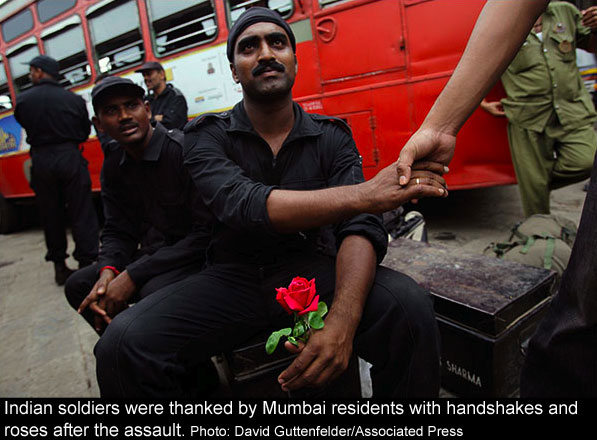When we see innocent people running our city streets, scrambling for shelter from acts of violence committed in God’s name, whether in Manhattan or Mumbai, it’s a good time to ask ourselves whether our religion is making us more divine or deranged. On the verge of 2009, it’s become all the more apparent that the first decade of the new millennium will, in many ways, be defined by the impact of religious terrorism on our nations, communities, families and minds. Times like these call for us to examine how our faith affects our reasoning.
Unfortunately, religious endeavor is as easily corrupted as any other human pursuit. It makes as little sense to ask whether religion is good or bad, as it does to ask whether things like parenthood, sexual love or medical care are good or bad. As with all activities, good or bad depends on a variety of factors. Any useful examination of them requires nuance and subtlety. Crass critiques of religious thought, like Bill Maher’s film “Religulous”, may provide a few laughs for skeptics, but fail to shed much light on the relation between religion and violence.
The most relevant questions about religion will address how we approach it. Religion, as a method of self-transformation (or yoga), can purify the heart, free us of unworthy instinct and compulsion, and nurture the best in us. A pure heart is fit to receive God’s grace in the form of wisdom, contentment and compassion. Conversely, a superficial approach sees religion as merely a ticket to salvation via membership to a group endowed with the favor of God. It can result in just the opposite, fostering pride, sectarianism and hate. It can become an instrument for the expression of exactly that which we need to be purified of. Which brings us to the real enemy: not Islam, not even extreme fundamentalist Islam.
Yogic literature speaks of six enemies (Ari-shad-vargas) which bind the soul: kama, (lust); krodha, (anger); lobha, (greed); mada, (madness); moha, (illusion); and matsarya, (hate and envy). True religion aims at uprooting these terrorists. The sincerity of ones purpose in their approach to religious practice weighs heavily in determining ones success. Will the soul be purified or putrefied?
The Vaishnava saint Rupa Goswami (1489-1564) spoke of the need for selflessness in religious life. He noted that bhakti (religious devotion) of the best kind is grounded in selflessness (anyabhilashita-shunyam).[1. Bhakti-rasamrita-sindhu 1.1.11] Free from various selfish motivations, genuine devotion is centered on service.
I believe that a large part of the purpose of human experience is to uncover the selflessness at our very core. Isn’t it the times of our lives most consumed in selfless service that we find the most meaningful? That selflessness which makes our hearts a worthy offering for God and a fit vessel for God’s grace is the real substance of peace. It fosters that upon which peace depends: forgiveness and empathy.
And so, I’ve found one silver lining sewn to the dark cloud of terrorism. That, in the midst of the ugliest of human acts we can find exceptionally selfless demonstrations of human benevolence. In New York we were moved by the images of firemen rushing into the World Trade Center towers as they were about to crumble. In Mumbai we hear of Taj Hotel employees building barricades with their own bodies to shield their guests from gunfire.
A recent interview on “Charlie Rose” features Michael and Anjali Pollack, husband and wife. Both were trapped in the Taj Hotel.
Aiming for a response which would capture a lesson from their experience, Charlie Rose asks: “When you look back at this, what do you want to tell your kids? What do you want to tell your parents?”
Michael Pollack’s reply: “The real gift, beyond the second chance at life, is to have seen the selfless nature of others at a time of absolute mayhem and barbarity, and to see how selfless human beings can really be, and pull together as a community in these periods. It’s something that Anjali and I can only hope to emulate in the future.”
So along with tears of sorrow for the deaths of innocents, come tears of love for strangers – ordinary people who, through their selfless sacrifice, show us something about the beauty and decency of humanity as well as the spiritual potential that lies within us all.
I would like to share with you the interview with Michael and Anjali Pollack as well as some audio clips from a dear friend. Radhanath Swami is an American born Vaishnava guru and monk in the bhakti tradition. He leads a wonderful congregation at the Radha Gopinath Temple in Mumbai. The Radha Gopinath Temple has one of Mumbia’s largest Hindu congregations, among who are Taj Hotel employees who witnessed the massacre, and others who lost relatives. In his talk, recorded just after the attacks, Radhanth Swami addresses the congregation and speaks of the six enemies mentioned above, those terrorists within each of us who threaten to kill that which we should ultimately value the most: our ability to love, serve, and commune with God and humanity.
Kaustubha das
Charlie Rose: Interview with Michael and Anjali Pollack

Radhanath Swami Addresses the Congregation of the Radha Gopinath Temple in Mumbai. Recorded November 30, 2008 [19.17mins.]
[audio:https://bhakticollective.com/_multimedia/RS Mumbai Talk.mp3]
Listen On This Site
Right-click to Download as Podcast
Note: This recording is a collection of short segments from a longer talk, spliced together.
Related Post: Radhanath Swami: A Few More Thoughts on Terror in Mumbai


Comments
One response to “Finding Selflessness Amidst Mumbai’s Sorrow”
Sorrow of Mumbai is sorrow of the entire world. Radhanath Swami being saintly person, feels pains of others as his own. All of us are children of God. Naturally Radhanath Swami is very compassionate. His selfless service is very much glorious.